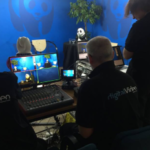In a world where technology is advancing rapidly, hybrid events offer a perfect balance between the accessibility of the virtual and the warmth of human interactions. They open the door to a wider audience and break down geographical barriers. The main advantage they offer is their immense flexibility. However, orchestrating a successful hybrid event goes beyond simply overlaying a virtual component onto a physical event. Discover in this article the subtleties of hybrid events, from technological tools to audience engagement strategies.
Table of Contents :
- Technology at the Heart of Hybrid Events
- Audience Engagement and Innovative Strategies
- Marketing of Hybrid Events
Technology at the Heart of Hybrid Events
In 2024, technology has become the backbone of hybrid events, playing a key role in blending physical and digital experiences. Let’s explore how different technologies transform these events and optimize the experience.
Augmented Reality, Virtual Reality
Augmented Reality (AR) and Virtual Reality (VR) offer unprecedented possibilities to enrich hybrid events. AR can overlay digital information in the physical environment, allowing on-site participants to interact with virtual elements. For example, at an exhibition, stands can be enhanced with interactive details visible only through AR devices.
As for VR, while current technologies do not yet allow for entirely virtual events, it can still be integrated into events. Some organizations choose to offer VR training to their participants. This approach is both fun and educational, contributing to making the event as memorable as possible.
Artificial Intelligence and Personalization
Artificial Intelligence has a lot of potentials in personalizing the experience of hybrid events. Through data analysis, AI can recommend specific sessions, professional meetings, and content tailored to the individual interests of participants. This increased personalization ensures a more relevant and engaging experience for each participant, whether online or on-site.
For example, if a participant is interested in digital marketing, AI could suggest other marketing professionals to discuss with or participate in discussion groups focused on the topic. The networking experience is more targeted and, therefore, more effective.
Audience Engagement and Innovative Strategies
Audience engagement is a cornerstone in the success of hybrid events. It’s no longer just about presenting content, but about creating a participatory and memorable experience for each participant.
Interactivity is Key
The key to engaging the audience in a hybrid event is to offer interactivity that transcends the boundaries of physical and digital. Tools such as live Q&A sessions, interactive workshops, and discussion spaces allow online participants to actively get involved. Organizers encourage participation using real-time voting technologies or feedback apps, creating a two-way dialogue between speakers and the audience.
Immersive Experiences and Gamification
Many organizers also incorporate elements of gamification. This can include challenges, games, or point-based activities, which stimulate healthy competition and interaction. Moreover, immersive experiences, such as augmented reality puzzles or virtual reality adventures, can transform an event into a fun and educational experience, thus boosting engagement and retention.
Engaging the Audience via Social Networks
Finally, social networks play a crucial role in audience engagement. By integrating social sharing features, such as event-specific hashtags or photo-sharing contests, organizers can extend the event experience beyond its physical or digital limits. This not only encourages active participation but also helps to build a community around the event.
Moreover, live features on platforms like Facebook or Instagram are still underused, although their added value is real. They allow participants to react, comment, and interact directly with speakers, strengthening their sense of being integrated into the event even if they are not physically present.
Marketing of Hybrid Events
The marketing of hybrid events has evolved significantly in recent years to meet the unique challenges presented by hybrid events. Marketing strategies must not only attract participants but also effectively communicate the added value of the hybrid experience.
Targeting and Analysis
With a potential audience expanded by the hybrid format, targeting becomes more crucial than ever. Marketers use demographic, behavioral, and psychographic data to segment their audience and create personalized messages. Targeted campaigns allow reaching the right individuals, whether they prefer to participate online or in person, thus maximizing the effectiveness of marketing efforts.
Finally, marketing for hybrid events requires constant analysis and rapid adaptation. Analytical tools allow marketers to track the performance of their campaigns in real time and adjust their strategies to maximize impact. This agility enables staying relevant and effective in a rapidly changing environment.
The Importance of Storytelling
Effective communication for a hybrid event involves using multiple content formats – blogs, videos, podcasts, and social media posts. Storytelling is at the heart of these contents, telling the story of the event, its speakers, its participants, and the unique experiences it offers. This narrative approach not only sells the event but also creates an emotional connection with the potential audience.
The Future of Hybrid Events
If the Covid pandemic has shown us that virtual does not yet replace face-to-face contacts, technological innovations are getting us closer and redefining our perception of what an event is. Some occasions are irreplaceable by the virtual; others are optimized by the digital experience. What then is the future of hybrid events?
Augmenting Reality or Virtualizing Reality?
As mentioned at the beginning of this article, technological tools are evolving and so are events with them. For example, holographic technology could allow speakers or artists to perform simultaneously on multiple stages, virtual and physical, around the world.
Augmented Reality will also likely play a part in these changes. While it is already integrated into events, it is expected to become even more immersive and interactive, which will effectively reduce many costs in terms of equipment and human resources. These changes will optimize hybrid events.
Other possible changes point towards a virtualization of our events. We’re especially looking forward to the highly anticipated advent of the metaverse and the spectacular evolutions of virtual reality. Online participants, for example, might explore a 3D virtual exhibition space, interacting with products or services as if they were physically present.
Finally, artificial intelligence could be used to create personalized itineraries for participants, while data collected during the event could help improve future experiences. Connectivity will allow for better quality live transmission and smoother real-time interactions.
Audience Expectations
Today, the audience expects more than just a live broadcast of a physical event. Online participants seek an immersive and interactive experience, where they can feel as involved and valued as those who are on-site. This expectation pushes organizers to constantly innovate in how they design and execute hybrid events, with a focus on personalization, accessibility, and inclusion.
This means not only adopting new technologies but also rethinking the very structure of the event. Sessions could be designed to encourage richer interaction between physical and virtual participants, and schedules could be adapted to cover different time zones.
Choosing the Right Agency
Whether you’re planning a product launch, a conference, or a seminar, our team of experts is ready to assist you at every step. We guarantee a seamless experience for all participants, whether they are on-site or online.
Contact us to create a hybrid event with creativity and professionalism.



